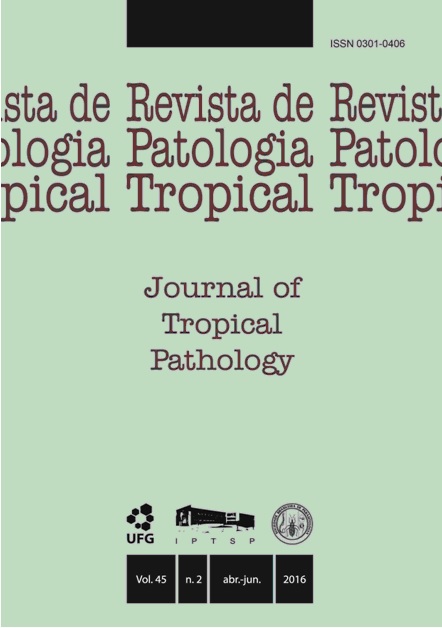AVALIAÇÃO DA ATIVIDADE ESQUISTOSSOMICIDA DO CARVACROL EM EXPERIMENTOS IN VITRO E IN VIVO
DOI:
https://doi.org/10.5216/rpt.v45i2.41957Palavras-chave:
Schistosoma mansoni, esquistossomose, quimioterapia.Resumo
A atividade esquistossomicida do carvacrol e do acetato de carvacrol foi avaliada utilizando-se camundongos Swiss, com peso aproximado de 20g, infectados com cercarias de Schistosoma mansoni. Os experimentos in vitro e in vivo foram realizados conforme a metodologia descrita no tópico específico do presente artigo. Nos dois experimentos in vitro, as concentrações foram de 4 ?g/mL ou 8?g/mL. Nas experiências in vivo, um grupo de dez animais foi tratado, por via oral, com 300mg/kg durante cinco dias consecutivos e, em outros dois grupos também de dez animais, foram administradas, por via oral, as doses únicas de 15 mg/kg ou 30 mg/kg. Os dois compostos mostraram-se ativos na concentração de 4?g/mL, causando a morte dos vermes adultos de S. mansoni em menos de 24 horas de contato, quando os testes foram realizados in vitro. Nos experimentos in vivo, considerados os três esquemas terapêuticos utilizados, não se observou diferença significativa na eficácia dos compostos. Diante dos resultados obtidos, conclui-se que os compostos estudados são viáveis para estudos in vitro, mas não apresentam atividade in vivo, indicando que testes in vitro não são suficientes para caracterizar um agente esquistossomicida. A falta de atividade in vivo sugere que estes compostos, na forma utilizada, não podem ser considerados como esquistossomicidas para uso clínico. É importante ter em mente que, apesar de útil, a abordagem in vitro é uma simulação da realidade, mas, definitivamente, uma abordagem não substituirá a outra.
Downloads
Downloads
Publicado
Como Citar
Edição
Seção
Licença
The manuscript submission must be accompanied by a letter signed by all authors stating their full name and email address, confirming that the manuscript or part of it has not been published or is under consideration for publication elsewhere, and agreeing to transfer copyright in all media and formats for Journal of Tropical Pathology.

